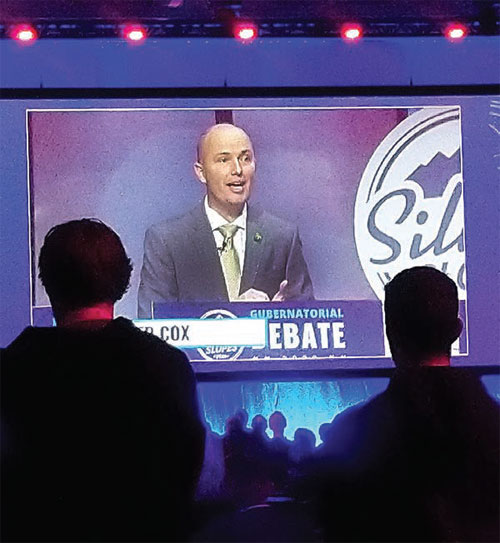By Brice Wallace
The incentives program at the Governor’s Office of Economic Development (GOED) could be in for some major changes next year.
While some adjustments could come during the current legislative session, during the Silicon Slopes Tech Summit, a pair of gubernatorial candidates said the program needs to be changed or at least reviewed in order to ensure it fits today’s Utah economy and the state’s economic development goals.{mprestriction ids="1,3"}
The incentives, primarily in the form of tax credits given after companies create high-paying jobs, are designed to entice out-of-state companies to put operations in Utah or expand the operations of in-state companies.
Spencer Cox, currently lieutenant governor, acknowledged that he has been critical of the way incentives are awarded. “I think we need to make a change,” he said during the summit’s gubernatorial debate.
When Gary Herbert became governor in 2009, the state was in the depths of the Great Recession, had an 8 percent unemployment rate and had people and companies leaving. “We were in desperate times,” Cox said.
But Herbert worked to make Utah a premier business destination in the U.S. “By the way, it’s worked,” Cox said, adding that incentives enabled Utah to bring companies to the state. “That made sense at that time and I’m grateful that that happened,” he said.
Utah has led the nation in private-sector job growth the past 10 years, at 36 percent. “Again, it’s happening because of the entrepreneurs here in this room and it happened because we were able to attract some of the best companies in the world to Utah, and they’re here and making an enormous difference, and we should be proud of that,” Cox said.
But that works, he said, when unemployment is at 8 percent, not the current 2.3 percent — the lowest in Utah history and currently the lowest in the U.S.
“Why on Earth would we be giving away tax incentives to companies to come here at 2.3 percent unemployment when there aren’t any employees for them to hire in the first place?” Cox asked. “Why would we be giving away taxpayer dollars for that?”
Instead, the state needs a flexible system that allows it to use incentives when economic times are bad but “change that focus” when times are good. Rather than incentives, the priorities should be to offer companies workforce development and education and to improve infrastructure, he said.
“And, by the way, most of them are coming anyway,” he said of incentivized companies. “They don’t need an incentive to come here. … We are not the same state that we were 10 years ago. We’ve grown up in very, very powerful ways,” Cox said.
Another candidate, former Gov. Jon Huntsman Jr., created GOED in 2005 by dismantling the Department of Community and Economic Development and putting GOED in the executive branch. That change, as well as a state rebranding and tax reform, helped Utah during that time, he said.
“We built it (GOED) to be small, nimble and to ensure the competitiveness of this state. Every other state in American wanted [to have] GOED. It was the hottest thing we had going for us,” Huntsman said.
“Today, GOED has become kind of a holding company for a lot of different things, and I think it’s probably worth a good review, because it’s got to get back to something that’s fast, smart, lean, agile and keeps Utah right at the very front of economic development.”
Following GOED’s review of its programs last year, changes are afoot in the current legislative session. One likely will focus on the requirement that an incentive award takes place only if Utah is competing with other locations for a company project.
“Right now, if you want an incentive, you have to threaten to go to Colorado or someplace else. That’s crazy,” Cox said, adding that another change might increase the new-job wage requirements “so we’re really giving it away for the best jobs, not for any job.”
Candidate Jeff Burningham, a businessman, wondered if incentives are needed.
“Let me just make it clear: There are not a thousand government programs that can create what you, the entrepreneurs of Silicon Slopes, have created — not a thousand government programs,” Burningham said.
“We did not need to attract people here. The entrepreneurs were here. They needed a fertile ground with capital and other resources. Politicians are enablers of the political systems that have made them, while entrepreneurs are disrupters of the status quo and make greater opportunities for us all. And that’s why we need to elect an outsider, an entrepreneur, someone who does not come from the political system.”
None of the other candidates had the GOED question posed to them by moderator Clint Betts, executive director of Silicon Slopes. He prefaced the discussion by saying that “critics might say GOED favors out-of-state businesses” for incentives that could give them an advantage over Utah home-grown companies. He questioned whether GOED should exist “or is it just a form of corporate welfare for the politically well-connected?”
In 2019, GOED awarded 20 tax credit incentives. Nine were for in-state companies, 11 were from out-of-state. Typically, about 60 percent of incentives are awarded to in-state companies and 40 percent to companies outside Utah.{/mprestriction}








